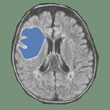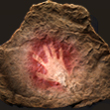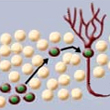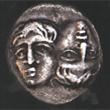Monday, 31 December 2012
Speaking Without Broca’s Area

From Dr. Paul Broca’s observations in the 1860s, we know that the left inferior frontal cortex of the brain, now also known as Broca’s area, is heavily involved in human language abilities. At first, this area was thought to be associated only with the production of language, but gradually its role has come to be regarded as more complex, and recent brain-imaging data have actually made the old dichotomy between language-production areas and language-understanding areas somewhat obsolete. (more…)
From Thought to Language | Comments Closed
Monday, 24 December 2012
What does it mean to be human?
 The web site What does it mean to be human? was developed by the Smithsonian National Museum of Natural History in Washington D.C.. Dedicated to the dissemination of knowledge on the evolution of the human species, this site, with its graphics evoking the African savanna, the cradle of humanity, addresses myriad questions that will arouse the curiosity of a wide audience—questions such as:
The web site What does it mean to be human? was developed by the Smithsonian National Museum of Natural History in Washington D.C.. Dedicated to the dissemination of knowledge on the evolution of the human species, this site, with its graphics evoking the African savanna, the cradle of humanity, addresses myriad questions that will arouse the curiosity of a wide audience—questions such as:
How do evolution and Darwinian natural selection work?
What is the relationship between humans and the species of apes alive today?
Did humans evolve in a straight line, one species after another?
How can scientists estimate the age of a fossil, or the climate conditions a million years ago?
Is the concept of evolution compatible with religion? (more…)
Evolution and the Brain | Comments Closed
Monday, 17 December 2012
Neurogenesis and Depression
 The processes leading to the many different illnesses that can affect people’s psychic equilibrium are still hotly debated. Often, these processes involve multiple contributing factors which is why there are so many different hypotheses about them. In the case of depression, for example, one of the best known is the monoamine hypothesis, which associates the disease with underactivity of certain neurotransmitters. such as serotonin.
The processes leading to the many different illnesses that can affect people’s psychic equilibrium are still hotly debated. Often, these processes involve multiple contributing factors which is why there are so many different hypotheses about them. In the case of depression, for example, one of the best known is the monoamine hypothesis, which associates the disease with underactivity of certain neurotransmitters. such as serotonin.
Several research laboratories are now working on a more recent hypothesis about the cause of depression, involving a phenomenon that was first confirmed in humans in the late 1990s: neurogenesis, meaning the birth of new neurons in the adult brain. The starting point for this hypothesis is that these young neurons seem to show greater plasticity and are found only in certain parts of the brain, such as the dentate gyrus of the hippocampus, that are associated with emotions. (more…)
Memory and the Brain, Mental Disorders | Comments Closed
Monday, 10 December 2012
Two Systems of Thought in a Single Brain?

The idea that the human mind uses more than one kind of reasoning mechanism is very old. In fact, this notion has always been part of our attempts to understand the architecture of the mind. The dual-process theories that are current today follow this long tradition. Simply put, these theories hold that two major types of cognitive processes coexist in the human brain: one that is fast, automatic, and unconscious, and another that is slower, more flexible, and requires conscious control. (more…)
From Thought to Language, The Emergence of Consciousness | Comments Closed
Monday, 3 December 2012
Your Brain Likes Nature Better Than E-Mail

In the early summer of 2010, five neuroscientists spent a week all on their own, rafting and camping along the San Juan River in a remote area of southern Utah, in the United States. Nothing so special about that—plenty of people make these kinds of wilderness expeditions nowadays.
What made this adventure different was that these scientists gave themselves two additional challenges. Knowing that workaholism tends to come with their profession, they decided to spend the entire week without their cell phones and laptop computers. And being neuroscientists, they decided to observe their own reactions to this deprivation and thereby try to shed light on their own hypotheses about how daily use of these technologies may be changing the ways that people think and behave. (more…)
The Emergence of Consciousness | Comments Closed








